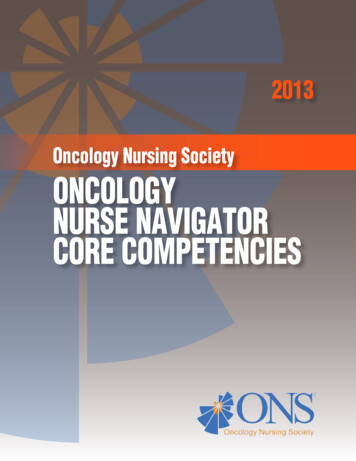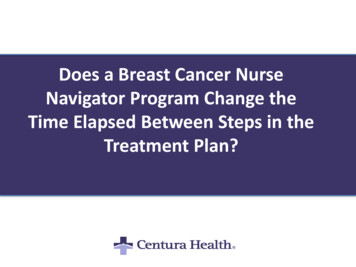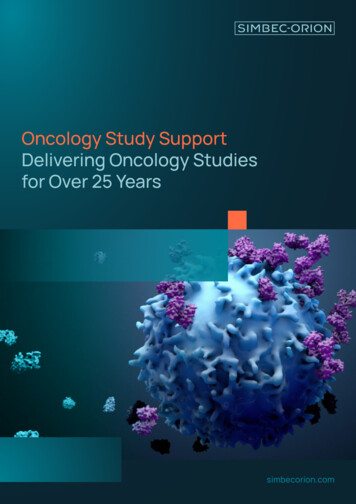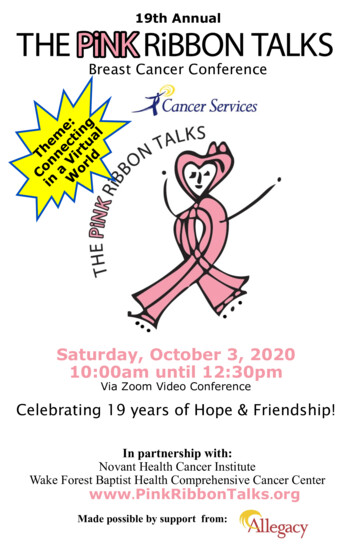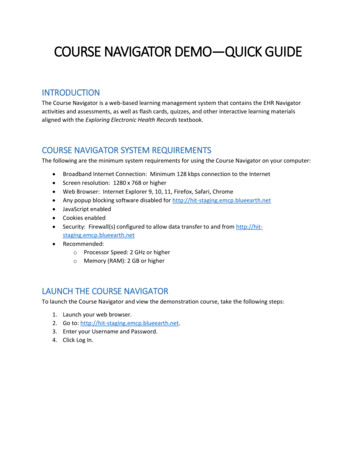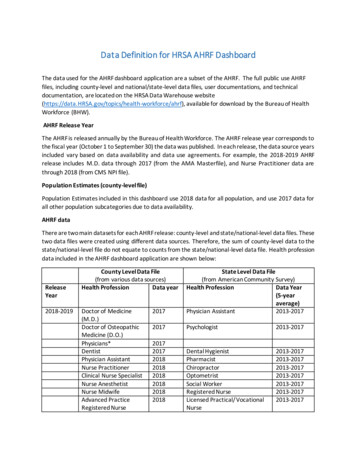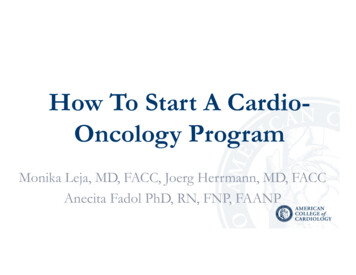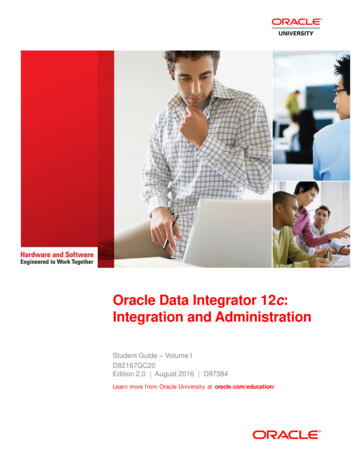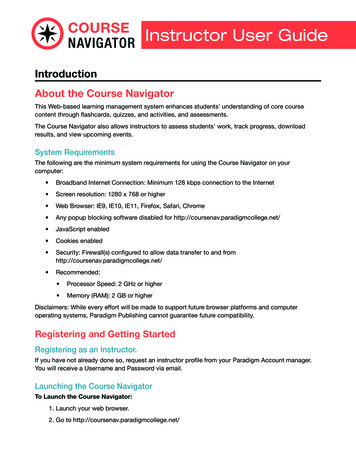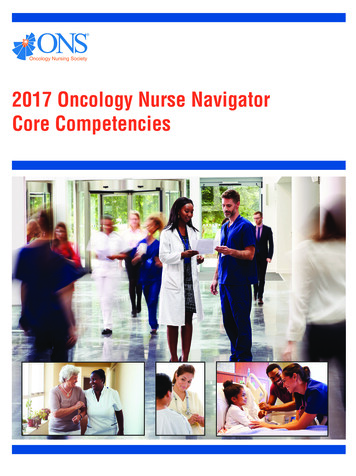
Transcription
2017 Oncology Nurse NavigatorCore Competencies
2Table of ContentsKey Terms Used in Competencies. 4Purpose of Competency Development. 4Definition of Oncology Nurse Navigator Core Competencies. 4Process of Competency Development. 5Applicability and Dissemination. 6Scope of ONN Practice. 6Summary. 8References. 8CompetenciesA. Coordination of Care. 9B. Communication. 10C. Education. 10D. Professional Role. 11E. Expert ONN. 11Project Team MembersLori McMullen, RN, MSN, OCN ; Team LeaderClinical and Program Manager, Cancer ServicesMatthews Center for Cancer CareUniversity Medical Center of Princeton at PlainsboroPlainsboro, NJDeborah Christensen, MSN, APRN, AOCNS , HNB-BCOncology Nurse NavigatorSouthwest Cancer CenterSt. George, UTPamela J. Haylock, PhD, RN, FAANAdjunct Faculty, Sul Ross State University, Alpine, TXOncology Care Consultant, EducatorMedina, TXTraudi Rose RN, BSN, MBA, OCN VISN20 Program Manager for the Cancer Care NavigationTeamVA Portland Health Care SystemPortland, ORJean B. Sellers, RN, MSNAdministrative Clinical Director–UNC Cancer NetworkUNC Lineberger Comprehensive Cancer CenterChapel Hill, NCDominique Srdanovic, RN, MA, OCN GU Oncology Nurse NavigatorStamford Hospital, Bennett Cancer CenterStamford, CTONS StaffKristen Baileys, MSN, CRNP, OCN Independent Contractor/Oncology APRN ConsultantOncology Nursing SocietyPittsburgh, PABarbara Lubejko, RN, MSOncology Clinical SpecialistOncology Nursing SocietyPittsburgh, PAPhoto credits: main image, monkeybusinessimages/iStock/Thinkstock; from left to right, jacoblund/iStock/Thinkstock; Jose Luiz PelaezInc./Blend Images/Thinkstock; monkeybusinessimages/iStock/Thinkstock2017 Oncology Nurse Navigator Core Competencies
3Expert ReviewersKaryl Blaseg, RN, MSN, OCN Director of Cancer Services, Integrative Medicine, andSupportive CareBillings ClinicBillings, MTMarie Borsellino, RN, MSN, OCN Program Manager, Oncology Nurse NavigatorManaging Cancer at WorkKimmel Comprehensive Cancer CenterJohns Hopkins Hospital and Health SystemBaltimore, MDGean Brown, MSN, RN, OCN Nurse ManagerBennett Cancer CenterStamford Hospital, CTCynthia (Cindi) Cantril, RN, OCN , CBCN , MPHDirector Cancer Support Services/Patient NavigationSutter Pacific Medical FoundationSanta Rosa, CARebecca Crane-Okada, PhD, RN, CNS, AOCN Director of Breast Cancer Navigation and Willow SageWellness ProgramsMargie Petersen Breast CenterProfessor of OncologyJohn Wayne Cancer InstituteProvidence Saint John’s Health CenterSanta Monica, CALori Hartinger, BSN, OCN , CN-BNLead Navigator/Breast Cancer NavigatorShady Grove Breast CenterRockville, MDJoy Hepkins, RN, BSN, OCN Oncology Nurse NavigatorMercy Fitzgerald HospitalDarby, PACarrie Lee, MSN, RN, OCN Genesis Cancer Care CenterZanesville, OHDiane McElwain, RN, OCN , M.EdRetired Oncology Coordinator, York Cancer Center, WellSpanNurse ConsultantYork, PAMargaret Rummel, BSN, MHA, OCN , NE-BCOncology Nurse NavigatorAbramson Cancer Center, Penn MedicinePhiladelphia, PASusan Scott, BSN, RN, OCN Oncology Nurse NavigatorLung and Head and Neck CancersBurbank, CALynsi Slind, RN, MN, OCN Cancer Care Navigation Team RNVA Puget Sound Health Care SystemSeattle, WA uth Van Gerpen MS, RN-BC, APRN-CNS, AOCNS ROncology Nurse NavigatorBryan HealthLincoln NECopyright 2017 by the Oncology Nursing Society. All rights reserved. For permission to reprint, adapt, postonline, or otherwise reuse at your institution, please email pubpermissions@ons.org.2017 Oncology Nurse Navigator Core Competencies
4Key Terms Used in CompetenciesOncology nurse navigator: An oncology nurse navigator(ONN) is a professional RN with oncology-specific clinicalknowledge who offers individualized assistance to patients,families, and caregivers to help overcome healthcare systembarriers. Using the nursing process, an ONN provides education and resources to facilitate informed decision making andtimely access to quality health and psychosocial care throughout all phases of the cancer continuum.Lay navigator: A trained nonprofessional or volunteer whoprovides individualized assistance to patients, families, andcaregivers to help overcome healthcare system barriers and facilitate timely access to quality health and psychosocial carefrom prediagnosis through all phases of the cancer experience(Oncology Nursing Society [ONS], 2010).Novice ONN: A nurse who has worked two years or less in theONN role and is building upon his or her academic preparation, nursing knowledge, and oncology navigation experienceto develop in the ONN role.Expert ONN: An ONN who has worked at least three years,is proficient in the role, and has the education and experienceto use critical thinking and decision-making skills pertainingto the evolution of navigation processes and the individualONN.Purpose of Competency DevelopmentCore competencies refer to a specific area of expertise that isvital to performing in a role (National Institute of Standardsand Technology, 2015). In 2011, ONS recognized that a growing number of oncology nurses identified ONN as their primary role function. Supported by data collected in the ONS NurseNavigator Survey, the first ONN role delineation study (RDS)(Brown et al., 2012), and anecdotal information from the ONSNurse Navigator Special Interest Group (SIG), ONS identifiedthe need to clearly define the role of the ONN, as well as support growth and standardization of the role. This need led tothe ONS Board of Directors’ plan for the development of theinitial ONN competencies (ONS, 2013).In 2015, the ONS Nurse Navigation SIG leadership team collaborated with the ONS Board of Directors to compose a position statement. The ONS Position on The Role and Qualifications of the Oncology Nurse Navigator highlights the ONNrole in supporting organizational strategies across the cancercare continuum, necessitating the ONN to master knowledge,skills, and tasks that allow him or her to influence network sys2017 Oncology Nurse Navigator Core Competenciestems and behaviors, community needs assessment, navigationprogram development, marketing and outreach, understanding and use of ONN-specific outcomes metrics, and identification of gaps in and strategies to meet continuum-based needs.In addition, cancer survivorship planning is increasingly acomponent in the navigator role expectations (Lubejko et al.,2016; ONS, 2015).As ONS continues work to refine and support the role of theONN, a second RDS was conducted in 2016 to determinewhether the ONN role was changing and whether there wassufficient information to support the development of an ONNcertification examination. Findings of this RDS (Lubejko et al.,2016) revealed that, while the knowledge needed for each roleare similar, differences exist between the focuses of the clinicaloncology nurse and ONN roles.The practice focus of the ONN is on education and coaching of colleagues about the navigation role, collaboration toidentify and learn best practices, marketing, and populationand systems-level tasks (Lubejko et al., 2016). The RDS revealed that, although care coordination is an integral component of oncology nursing in general, the clinical or staffnurse usually focuses on meeting patients’ clinical needs inone setting, whereas the ONN most often provides care coordination, guidance, education, and advocacy across caresettings (Lubejko et al., 2016). Also in 2016, the name of theONS Nurse Navigation SIG was broadened to the Navigationand Care Coordination Community to acknowledge andhighlight that care coordination is a key component of theONN role.Based on the RDS results and feedback from ONS membership, a process was initiated to evaluate and update the ONNcore competencies developed in 2013. The ONN competencies are meant to reflect practice across most settings withconsideration of the context of the individual navigation program.Definition of Oncology Nurse NavigatorCore CompetenciesThe ONN competencies outline the fundamental and advanced knowledge, skills, and expertise needed to effectively(a) coordinate the care of patients with a past, current, or potential diagnosis of cancer; (b) assist patients with cancer, families, and caregivers to overcome healthcare system barriers;and (c) provide education and resources to facilitate informeddeci sion making and timely access to quality health and psychosocial care throughout all phases of the cancer care continuum (CCC).
5Process of Competency DevelopmentONS uses a multi-step process that starts with a literature review and expert opinion to identify and compare commoncompetency themes and gaps and develop a preliminary list ofcompetencies. The draft competences are then vetted throughfield and expert review. This process is unchanged for the updated ONN core competencies.Before beginning the process of updating the competencies,a project team was identified. The project team included sixONS members and two ONS staff. The ONS members werechosen because of their expertise related to the ONN role ina variety of settings and areas of the country. They were alsochosen because of their demonstrated leadership abilities.Early in the process of ONN competency review, the projectteam noted that most nurses currently in oncology navigation roles bring extensive oncology nursing experience anda growing number have lengthy experience in navigation.The data indicated the need to recognize progression in theknowledge, skills, and tasks—the competencies—that differentiate novice and experienced or expert ONNs. A progression in the current ONN core competency structure toinclude a category detailing expert ONN core competencieswas included in the process of competency development andvetting.Step 1: Develop List of Core CompetenciesThe literature review included publications from 2013–2016and focused on skill and knowledge requirements, positiondescriptions, and the American College of Surgeons Commission on Cancer (2016) guidelines. In addition, the projectteam reviewed current ONS competency documents—theOncology Clinical Trials Nurse Competencies, the OncologyClinical Nurse Specialist Competencies, the Oncology NursePractitioner Competencies, and the Leadership Competencies(ONS, 2007, 2008, 2012, 2016)—to review the scope and process involved in professional competency development. It wasalso pertinent that the project team reviewed the 2016 ONNRDS. This study evaluated the nursing tasks that are more often the responsibility of the ONN as opposed to the clinical/staff oncology nurse (Lubejko et al., 2016).A brainstorming session resulted in revisions to the key termsused to define navigators in the 2013 document: ONN, laynavigator and novice navigator. Based on the evidence andBenner’s (1984) theory From Novice to Expert: Excellence andPower in Clinical Nursing Practice, the project team added“proficient” ONN to the list of key terms used to define typesof navigators. Ultimately, proficient was changed to “expert” toalign with the recommendations of the expert reviewers.The definition of a novice ONN remains unchanged from theoriginal competencies.An oncology nurse navigator is a professional registerednurse with oncology-specific clinical knowledge who offers individualized assistance to patients, families, andcaregivers to help overcome healthcare system barriers.Utilizing the nursing process, an oncology nurse navigatorprovides education and resources to facilitate informeddecision making and timely access to quality health andpsychosocial care throughout all phases of the cancer continuum (ONS, 2013).Having a clear definition of an ONN allows for a uniform understanding of who fills the role of ONN and differentiates theONN from the lay navigator.A definition for an expert ONN was added:An ONN who has worked at least three years, is proficientin the role and has the education and experience to usecritical thinking and decision-making skills pertaining tothe evolution of navigation processes and the individualONN.The 2013 project team divided the knowledge base and function of the ONN into four categories: professional role, education, coordination of care, and communication. The categories were reordered by the 2016 project team to coordinationof care, communication, education, and professional role tohighlight the operational focus of the ONN.After review of the 2013 competencies, the literature and theirknowledge of the ONN role, the project team agreed on 42novice ONN competencies and 9 expert ONN competencies,for a total of 51 competencies. The expert competencies wereadded to demonstrate an advanced level of knowledge of ONNpractice, process improvement, decision making, and criticalthinking skills.The ONN professional practice framework, originally developed by the 2013 project team, was enhanced to reflect thecore competency categories within the first circle of ONNpractice. In addition, because of the complexity and durabilityof the ONN role across the cancer continuum, the project teamadded an ONN care model. This model will be discussed laterin this document.Step 2: Field ReviewTo validate the revised competencies, a field review was thenconducted. Field reviewers were asked to comment on clarityand accuracy of the key definitions of a navigator and if thelist of requirements were appropriate for an ONN. The field2017 Oncology Nurse Navigator Core Competencies
6reviewers were then asked to comment on whether each novice and proficient competency should be included in the finalONN core competencies document and to make suggestionson competencies that might be included.The field review survey was sent to all ONS Nurse Navigator SIG members, as well as all ONS members who reportedtheir primary work function to be nurse navigation, for a totalof 5,137 nurses. A total of 148 responses were received. Theresponses represented all regions of the country and a widevariety of practice settings. Participants reflected diversity ineducational levels, years of practice as a nurse, and tumor sitesnavigated.Based on field review ratings and individual comments, editswere made to the key definitions of the ONN, initial requirements for an ONN, as well as novice and expert competencies.The edits were made to reduce redundancy, clarify competencies, and appropriately classify novice and expert competencies: one novice competency was moved to the expert categoryand two additional expert competencies were created for a total of 53 competencies.Step 3: Expert ReviewTwelve expert reviewers were identified and agreed to complete a review of the ONN core competencies. These expertswere chosen based on their years of experience and leadershiproles in ONN. The expert reviewers were asked to commenton the flow, clarity, completeness, and appropriateness of theoverall novice and expert competencies, as well as to providefeedback on individual statements. Based on their feedback,Figure 1. Professional Practice FrameworkOncologyPlanCoordinateivesitenly salturvoPatientEdrseeOrganizationateApplicability and DisseminationThe intent of the development of these core competencies wasto assist with refining the role of the ONN based on publishedevidence. However, because the ONN can function in any or allphases of the cancer continuum, it can be difficult to visualizewhere the ONN can have an impact on patient care and outcomes. To more clearly depict the broad impact of the ONN,an Oncology Nurse Navigation Care Model (ONNCM) wasdeveloped to visually represent how an ONN can affect eachphase of the CCC (see Figure 2). These phases are well definedin the literature and include: prevention and screening, diagnosis, treatment, survivorship, and end-of-life care (Levit, Balogh,Nass, & Granz, 2013). The ONN competency project team added advanced and metastatic cancer as an additional phase wherean ONN can continue to guide and support patients. Feedbackrequested during field and expert review supported the clarityand accuracy of the ONNCM.Scope of ONN PracticeteicaucNucatImproved outcomesTo provide a foundation for ONNs and to clearly portraywhere the ONN role fits within their organization and withtheir patients, the ONN Project Team relied on their extensivereview of the literature to develop an organizing frameworkfor the ONN. The framework articulates ONN practice androle function, thereby providing support for the developmentof the competencies (see Figure 1). The defining feature for theONN is the ability to deliver care using the steps of the nursingprocess: assess, plan, implement, and evaluate. In practice, theONN demonstrates the functional skills to coordinate, communicate, educate, collaborate, and advocate, all within thecontext of cultural sensitivity. The core of the framework, andkey element in understanding the function of the ONN, is theconcept of working for and within two operational domains:the patient and the healthcare system. The ONN works to influence positive patient outcomes but also to promote positivesystem outcomes through improved interdisciplinary communication, patient retention, and downstream revenues (Desimini et al., 2011; Fillion et al., 2012).AssessImplementlCuAdadditional edits were made and a final count of 53 core competencies was finalized: 41 novice and 12 expert.nmumCoEvaluateratovigNaNote. From “Oncology Nurse Navigator Core Competencies,” byOncology Nursing Society, 2013. Retrieved from ncies rev.pdf. Copyright 2013by Oncology Nursing Society. Reprinted with permission.2017 Oncology Nurse Navigator Core CompetenciesOncology survivors do not necessarily move in a linear fashionthrough the phases of the CCC. Therefore, ONN interventionsare portrayed as encircling the phases of the CCC. The ONNcare model depicts ONN interventions in a broad sense ineach of the following categories. Assess and address barriers to care: Barriers to quality cancer care differ among diagnoses, phase of the CCC, and from
7patient to patient. The role of the ONN is to carefully assesspatients for their unique barriers and to address those barriers in an individual way. Provide education, resources, and referrals: Providingeducation, resources, and referrals to local and national resources (i.e., physical/occupational therapy, dietitians, homehealth, financial counselors, and foundations) are at theheart of the ONN role. Facilitate shared decision making: Shared decision makinginvolves ensuring that patients are fully informed of risksand benefits of treatment options and that their values andpreferences are integrated into treatment decisions (Katz,Balkora, & Elwyn, 2014). The ONN can facilitate shared decision making and engage patients in their care by formingtrusting relationships and addressing patients’ communication and health literacy needs at all phases of the CCC. Promote advance care planning: The ONN can promoteadvance care planning by encouraging patients to talk abouttheir treatment wishes and overall goals of care. The ONNcan help patients formulate questions to discuss with theirhealthcare providers Support palliative care: The ONN can support patients’ useof palliative care services by assessing for late and long-termside effects and other physical barriers to patients’ quality oflife. The ONN can also be instrumental in helping patientsunderstand the difference between palliative care and hospice.In addition, because the role of the ONN is operationalizeddifferently across institutions, the competencies are intendedto provide a basic framework for the ONN role and responsibilities. The competencies can be used in many ways, includingbut not limited to the following (McMullen et al., 2016): Developing the role of the ONN Assist with job description development. Providing managers with information to successfully screenapplicants for ONN positions Developing orientation programs Providing guidance for preceptorship of new ONNs Developing competency checklists Contributing toward the evaluation of a navigation program Promoting the role of the ONN Assist an organization in the identification of resources thatmay be needed to help novice ONNs mature professionallyand be successful in their role. Improve retention of ONNs as the result of clearer definitionand expectations of the role. Assist with the identification of ONN strengths and professional development needs. Use to establish performance and developmental goals withthe ONN. Assist managers, who may have a broad variety of professionalbackgrounds, in the overall evaluation of the ONN program. Assist in the promoting and education of the role of the ONNin the professional community and community at large.Knowledge and Skills Requirements for the ONNThe ONN plays a vital role in achieving successful outcomesfor patients with cancer and their families/caregivers. Researchhas clearly shown improved patient outcomes that resultedfrom the presence of an ONN (Case, 2011). To achieve successful patient outcomes, the ONN must possess a certain skillset. If the ONN does not posses this knowledge and skill setinitially, engagement in professional development opportunities would be beneficial. These skills may include but are notlimited to, Strong oncology knowledge. Certifications like OCN ,AOCN , AOCNS , AOCNP , and CHPON all demonstratespecific knowledge of cancer care for a specific patient population (i.e., adult or pediatric). Additional certifications, such asCBCN and and BMTCN , speak to the unique care needs andrequirements of even more specific patient populations andmay be beneficial for ONNs working in those sub-specialties. Basic knowledge of insurance reimbursement systems Working knowledge of financial hardships and payer coverage Working knowledge of national, regional, and communityresources Knowledge of self-care strategies and resources Critical-thinking skills Strong leadership skillsFigure 2. Oncology Nurse Navigation Care ModelAssess and address barriers to careProvide education, resources, and referralsPrevention andscreeningSurvivorshipDiagnosisAdvanced andmetastatic cancerTreatmentEnd of lifeFacilitate shared decision makingPromote advanced care planningSupport palliative care2017 Oncology Nurse Navigator Core Competencies
8 Strong interpersonal skills Ability to develop collaborative relationships both internallyand externally Ability to work in teams Ability to work autonomously Strong verbal and written communication skills Strong organizational skills Ability to prioritize and reprioritize quickly Basic computer skillsSummaryThe process to identify ONN core competencies and behaviorswas supported by evidence-based practice and validated by aconsensus-driven, peer-review process. The ONN ProfessionalPractice Framework highlights a bi-dimensional accountabilitybecause the ONN not only promotes timely access to care (Desimini et al., 2011; Fillion et al., 2012; Wilcox & Bruce, 2010),but also supports improved communication and continuity ofcancer services across the organization for patients, the cancercare team, and the healthcare system. The ONN Care Modelprovides a visual expression of how an ONN can affect eachpart of a patient’s cancer journey. The competencies outlined inthis document will provide novice and expert ONNs, practicingacross any tumor site, patient population, or healthcare setting,as well as their employers, foundational concepts to establishand expand programs by supporting the care coordination,functional role, and job responsibilities that are determined bythe needs of the patient, the community, and the organization(Pedersen & Hack, 2010; Wilcox & Bruce, 2010).ReferencesAmerican College of Surgeons Commission on Cancer. (2016). Cancer program standards: Ensuring patient-centered care. Retrieved from https://www.facs.org/ coc%20standards%20manual interactive%20pdf.ashxBenner, P. (1984). From novice to expert: Excellence and power in clinical nursing practice. Upper Saddle River, NJ: Prentice-Hall.Blaseg, K.D. (2014). Getting started as a nurse navigator. In K.D. Blaseg, P.Daugherty, and K.A. Gamblin (Eds.), Oncology nursing navigation: Delivering patient-centered care across the continuum (pp. 15–40). Pittsburgh, PA:Oncology Nursing Society.Brandt, J.M., & Wickham, R. (Eds.). (2013). Statement on the scope and standards of oncology nursing practice: Generalist and advanced practice. Pittsburgh, PA: Oncology Nursing Society.Brown, C.G., Cantril, C., McMullen, L., Barkley, D.L., Dietz, M., Murphy,2017 Oncology Nurse Navigator Core CompetenciesC.M., & Fabrey, L.J. (2012). Oncology nurse navigator role delineationstudy: An Oncology Nursing Society report. Clinical Journal of OncologyNursing, 16, 581–585.Cantril, C.A. (2014). Overview of nurse navigation. In K.D. Blaseg, P. Daugherty, and K.A. Gamblin (Eds.), Oncology nursing navigation: Delivering patient-centered care across the continuum (pp. 1–13). Pittsburgh, PA: Oncology Nursing Society.Case, M. (2011). Oncology nurse navigator: Ensuring safe passage. ClinicalJournal of Oncology Nursing, 15, 33–40. doi:10.1188/11.CJON.33-40Desimini, E.M., Kennedy, J.A., Helsley, M.F., Shiner, K., Denton, C., Rice, T.T.,. . . Lewis, M.G. (2011). Making the case for nurse navigators: Benefits, outcomes, and return on investment. Oncology Issues, 26(5), 26–33.Fillion, L., Cook, S., Veillette, A., Aubin, M., de Serres, M., Rainville, F., Doll, R. (2012). Professional navigation framework: Elaboration and validation in a Canadian context [Online exclusive]. Oncology Nursing Forum,39, E58–E69. doi:10.1188/12.ONF.E58-E69Katz, S., Belkora, J., & Elwyn, G. (2014). Shared decision making for treatmentof cancer: Challenges and opportunities. Journal of Oncology Practice, 10,206–208. doi:10.1200/JOP.2014.001434Levit, L., Balogh, E., Nass, S., & Ganz, P. (2013). Delivering high-quality cancercare: Charting a new course for a system in crisis. Washington, DC: NationalAcademic Press.Lubejko, B.G., Bellfield, S., Kahn, E., Lee, C., Peterson, N., Rose, T., . . . McCorkle, M. (2017). Oncology nurse navigation: Results of the 2016 role delineation study. Clinical Journal of Oncology Nursing, 21, 43–50.McMullen, L., Banman, T., DeGroot, J.M., Scott, S., Srdanovic, D., & Mackey,H. (2016). Providing novice navigators with a GPS for role development:Oncology nurse navigator competency project. Clinical Journal of OncologyNursing, 20, 31–38.National Institute of Standards and Technology. (2015). Baldrige excellencebuilder. Retrieved from /baldrige/publications/Baldrige Excellence Builder.pdfOncology Nursing Society. (2007). Oncology nurse practitioner competencies.Retrieved from sOncology Nursing Society. (2008). Oncology clinical nurse specialist competencies. Retrieved from sOncology Nursing Society. (2010). Oncology Nursing Society, the Associationof Oncology Social Work, and the National Association of Social Workersjoint position on the role of oncology nursing and oncology social work inpatient navigation. Retrieved from ation/patient-navigationOncology Nursing Society. (2012). Oncology Nursing Society leadership competencies. Retrieved from sOncology Nursing Society. (2013). Oncology nurse navigator core competencies. Pittsburgh, PA: Author.Oncology Nursing Society. (2015). Oncology nurse navigation role and qualifications. Retrieved from tion/onnOncology Nursing Society. (2016). Oncology clinical trials nurse competencies. Retrieved from sPedersen, A., & Hack, T.F. (2010). Pilots of oncology health care: A conceptanalysis of the patient navigator role. Oncology Nursing Forum, 37, 55–60.doi:10.1188/10.ONF.55-60Wilcox, B., & Bruce, S. (2010). Patient navigation: A “win-win” for all involved.Oncology Nursing Forum, 37, 21–25. doi:10.1188/10.ONF.21-25
9Competency Statements: Introductory StatementThe oncology nurse navigator (ONN) demonstrates critical thinking and uses the nursing process to assess and meet the needs ofpatients and their families/caregivers by providing care coordination throughout the cancer continuum. The ONN works betweenthe domains of the patient and family unit and the healthcare delivery syst
An oncology nurse navigator is a professional registered nurse with oncology-specific clinical knowledge who of-fers individualized assistance to patients, families, and caregivers to help overcome healthcare system barriers. Utilizing the nursing process, an oncology nurse navigator provides education and resources to facilitate informed
